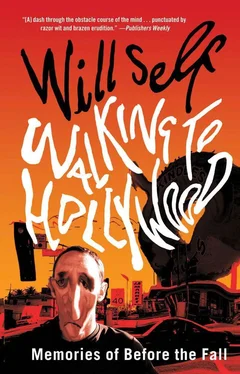Will Self - Walking to Hollywood
Здесь есть возможность читать онлайн «Will Self - Walking to Hollywood» весь текст электронной книги совершенно бесплатно (целиком полную версию без сокращений). В некоторых случаях можно слушать аудио, скачать через торрент в формате fb2 и присутствует краткое содержание. Год выпуска: 2011, Издательство: Grove/Atlantic, Inc., Жанр: Современная проза, на английском языке. Описание произведения, (предисловие) а так же отзывы посетителей доступны на портале библиотеки ЛибКат.
- Название:Walking to Hollywood
- Автор:
- Издательство:Grove/Atlantic, Inc.
- Жанр:
- Год:2011
- ISBN:нет данных
- Рейтинг книги:4 / 5. Голосов: 1
-
Избранное:Добавить в избранное
- Отзывы:
-
Ваша оценка:
- 80
- 1
- 2
- 3
- 4
- 5
Walking to Hollywood: краткое содержание, описание и аннотация
Предлагаем к чтению аннотацию, описание, краткое содержание или предисловие (зависит от того, что написал сам автор книги «Walking to Hollywood»). Если вы не нашли необходимую информацию о книге — напишите в комментариях, мы постараемся отыскать её.
Walking to Hollywood — читать онлайн бесплатно полную книгу (весь текст) целиком
Ниже представлен текст книги, разбитый по страницам. Система сохранения места последней прочитанной страницы, позволяет с удобством читать онлайн бесплатно книгу «Walking to Hollywood», без необходимости каждый раз заново искать на чём Вы остановились. Поставьте закладку, и сможете в любой момент перейти на страницу, на которой закончили чтение.
Интервал:
Закладка:
Really, it wasn’t the outer man I feared but the inner. Whatever may be said about the indelible marks of childhood memories, mine, for the most part, were vague and unthreatening. I could recall sitting in an antique Silver Cross pram with a pillowcase full of dirty laundry as my mother pushed it up Deansway to the laundrette in East Finchley. Sometimes I thought of a promotional Esso T-shirt I had loved fiercely — its bold blue roundel the target all futurity should aim at — that I had worn until it disintegrated. And then there was my third birthday.
That morning, after breakfast, my jealous brother told me he was going to run away from home. I said I would come as well and carefully packed one of my mother’s old handbags with toy cars, but when the time came to leave he said he wasn’t interested any more, so I set off alone. I can see now the terror-annihilated face of the lorry driver as I dashed across the North Circular in front of his wheels, and also the police car pulling up at the bus stop where I was waiting with what I imagined was mature casualness. And lunging up from that car, her face mottled and cracked like a saltpan, my mother — she was only forty-four when I ran away, but I fancy the taint was already on her: green grave weeds, rotting at the edges.
The bus stop was right beside the synagogue, at the end of Norrice Lea.

About three or four years after Behemoth was installed, my brother — who knew my love for all things out of scale — gave me a 1:200 scale model of Sherman’s sculpture. The metal figurine was dubbed a ‘minumental’ and had been made by Paul St George, an artist my brother knew. I’ve no idea whether St George is successful or not, but I thought it likely that it was his own massive sense of failure and envy that had been compressed into this, and the other teensy travesties he had made of his contemporaries’ works.
I placed the minumental Behemoth in among the little wooden blocks and cylinders modelled on London landmarks — Big Ben, the Millennium Wheel, Telecom Tower — that my daughter had bought for me at Muji, and that I had ranged about the base of the anglepoise in the middle of my desk. Attached to the lamp was a tuft of wool I had picked up from a hillside on the Shetland island of Foula — this was the off-white cloud on the horizon of the diminished capital.
The memory that preyed on me was both definite and embodied; it visited me on waking, dissolving only imperfectly to reveal the expected things — penis sputtering, kettle whistling — then reforming into Sherman’s rock-hard shoulders, the leaden disc of the garden pond, his pile-driving fist and the mouse mush.
I avoided Sherman because of my shame — and so Vamana played tricks on me. Over the years I betrayed an increasing preoccupation in my work with littleness, hugeness and all distortions of scale. Nobody gave a damn about the big stuff, but the wilful insertion of dwarfish characters into my stories was… insensitive. Worse still were the riffs on smallness I retailed to my cronies, and the paltry anecdotes they reciprocated with. How this one had attended the Little People of America convention, where he had seen a primordial dwarf *brother and sister treated like film stars. While that one had written a play about the actors who played the Munchkins in The Wizard of Oz ; they had stayed at the Culver City Hotel in Los Angeles during the shooting, and it was said they slept four to a bed, with predictably ‘comic’ antics.
Most shaming of all was the ‘game’ I devised for my children’s amusement when they were small, ‘Child or Dwarf’. Driving in the car, if one of us saw an ambiguous figure walking along the pavement we would cry out ‘Child or dwarf?’ and the others would make their guesses until we pulled past and turned to observe his or her face. What could possibly have been my motivation for this sick and derogatory form of ‘entertainment’, which was nothing less than laughing at someone’s misfortune? What was the difference between my behaviour and that of the Victorian showmen who had exhibited Charles Byrne, the Irish Giant, or Caroline Crachami, the Sicilian Dwarf? Even those who had taken these poor folk’s bodies when they died, dissected them, rearticulated their bones, then put their skeletons on show in the Hunterian Museum had science — or at least pseudo-science — on their side, but I had nothing but the sham jocundity of those who, having much to hide, expose themselves over and over again.
What did I expect to see when the car drew level with, then passed, the small and heroic figure that stumped between the elongated legs of the shoppers who font du lèche-vitrines along the King’s Road? Had that jacket been purchased in the boys’ outfitting department of Peter Jones by a parent or the person who wore it? Was this a child, a dwarf — or Sherman, who, until I had the courage to confront him, would remain both for me?
When I eventually met up with Sherman Oaks again he was nothing but charm itself. His eldest sister, Prima, had a share in a Bond Street gallery. I’d seen her about town — she was in her fifties now, but not showing it. She’d been sending me her pasteboards for a while before she began personalizing them. Then one day she sent an invitation to an opening that was emphatic: ‘Please come. Sherman will definitely be there, he so wants to see you again. Please.’
I went, and stood on the fringes of the openeers, a representative sample from the Venn intersection of Taste and Money that exhibited not much of either. The works themselves weren’t too bad: they looked like enormous drinks coasters attached to the hessian walls, and bore the curved stains that had, presumably, been left there by enormous glasses. I couldn’t identify the artist, but assumed he must be at the epicentre of a particularly dense thicket of tastefulness — assumed, until trunks parted and I spied Sherman holding forth.
I had seen photographs and television pictures of the great man; still, I was shocked. Sherman had always had the large head and short limbs associated with achondroplastic dwarfism. (I defer from using the term ‘disproportionate’; after all, who is to say which body form represents the human mean?) As a child, on his broad face the precise nose, etched cheekbones and petaline lips he shared with his sisters had seemed a little lost — morsels on a fleshy plate. Now the blue eyes weren’t just fierce but commanding, while the cultivation of neat moustachios and a stroke of beard accented his stronger features. He had, I realized, based his look on the Velázquez portrait of a court dwarf, Don Sebastián de Morro. This was typically Shermanesque chutzpah, then, as he came towards me, round-housing one leg then the other, I took in the well-cut dark clothes that allowed his face to float, as if disembodied, within its aureole of white-blond hair.
He came right up to me before saying hello. Sherman had always done this: tucked his short body inside the personal space of others, so challenging us to refute the idea that it was he who was the measure of all things. We talked easily and unaffectedly, although of what exactly I have no recall. Probably there was a deal of cynicism about the drinks coasters; I do remember laughing in a full-bellied way that I hadn’t since I’d last heard his devastating wit. He drew you in, Sherman, and so drew you down. You began by bending your neck, but, as he continued rubbishing reputations and lisping shibboleths, you’d find yourself bending over, then hunching, then hunkering down, until finally you were squatting or even kneeling in front of him, mesmerized both by what he said and by his unusual intonation — a trifle old-fashioned — as he barked, ‘Jolly good!’ or affirmed ‘Quite right!’ about something he himself had just said.
Читать дальшеИнтервал:
Закладка:
Похожие книги на «Walking to Hollywood»
Представляем Вашему вниманию похожие книги на «Walking to Hollywood» списком для выбора. Мы отобрали схожую по названию и смыслу литературу в надежде предоставить читателям больше вариантов отыскать новые, интересные, ещё непрочитанные произведения.
Обсуждение, отзывы о книге «Walking to Hollywood» и просто собственные мнения читателей. Оставьте ваши комментарии, напишите, что Вы думаете о произведении, его смысле или главных героях. Укажите что конкретно понравилось, а что нет, и почему Вы так считаете.












